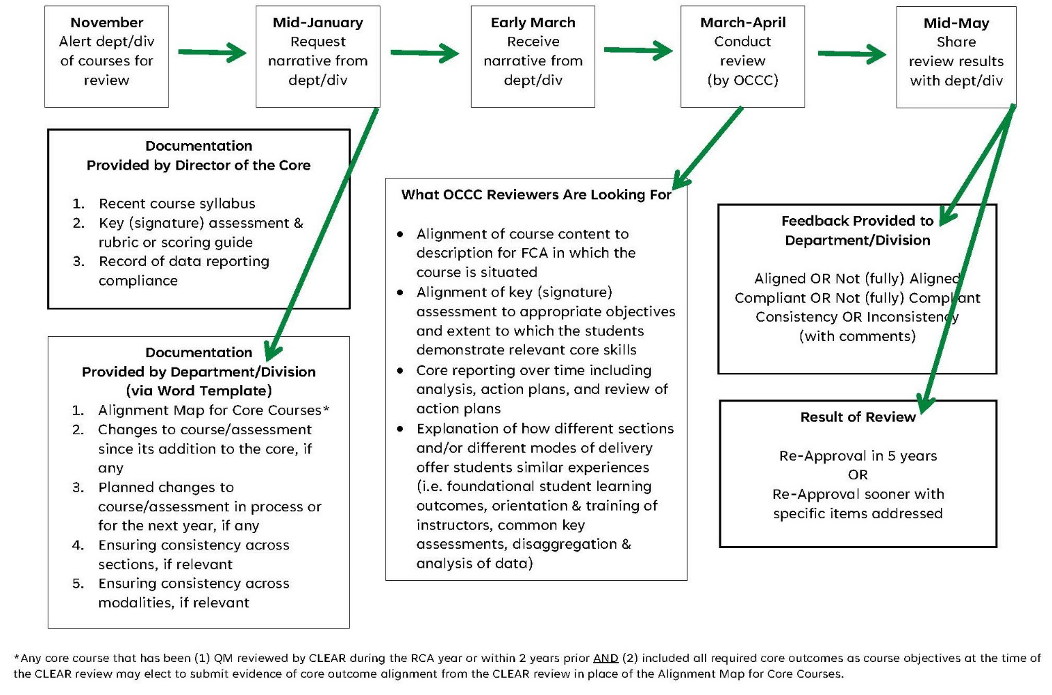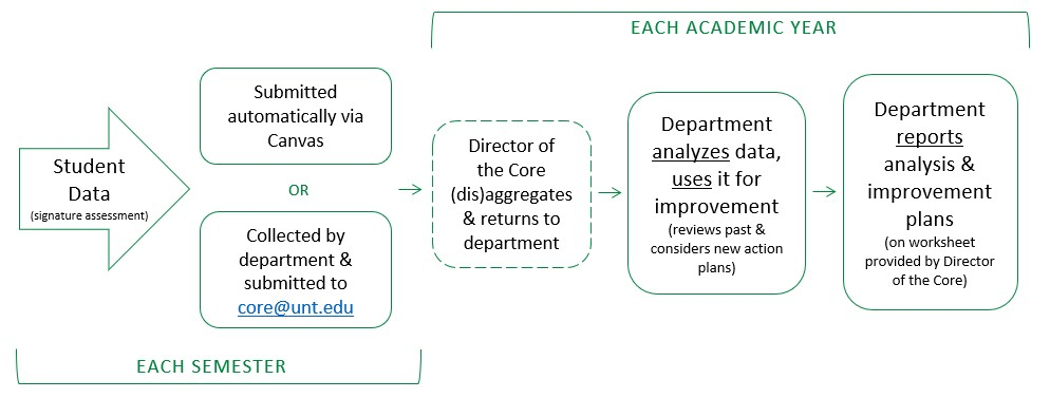Core Curriculum
UNT's Core Curriculum provides the foundation of undergraduate education, giving students a breadth of knowledge to inform their later development in their chosen area(s) of study. The state of Texas has mandated specific features of the Texas Core Curriculum, which is administered through the Texas Higher Education Coordinating Board (THECB). Students select core courses to meet the state semester credit hour requirements for each foundational component area for a total of 42 hours.
Core Curriculum Basics
THECB has identified six core objectives:
- Critical Thinking: creative thinking; innovation; inquiry; and analysis, evaluation, and synthesis of information
- Communication: effective development, interpretation, and expression of ideas through written, oral, and visual communication
- Empirical and Quantitative Skills: manipulation and analysis of numerical data or observable facts resulting in informed conclusions
- Teamwork: ability to consider different points of view and to work effectively with others to support a shared purpose or goal
- Social Responsibility: intercultural competence, knowledge of civic responsibility, and the ability to engage effectively in regional, national, and global communities
- Personal Responsibility: ability to connect choices, actions, and consequences to ethical decision-making
Courses in the core curriculum are organized under foundational component areas (FCA) and component area options (CAO) as established in the Texas Core Curriculum. Based on these categories, courses align to particular core outcomes. The eight FCA categories are:
- Communication (6 SCH) - Courses in this category focus on developing ideas and expressing them clearly, considering the effect of the message, fostering understanding and building the skills needed to communicate persuasively. Courses involve the command of oral, aural, written and visual literacy skills that enable people to exchange messages appropriate to the subject, occasion, and audience. (aligns to CT, C, T, PR)
- Mathematics (3 SCH) - Courses in this category focus on quantitative literacy in logic, patterns and relationships. Courses involve the understanding of key mathematical concepts and the application of appropriate quantitative tools to everyday experience. (aligns to CT, C, M)
- Life and Physical Sciences (6 SCH) - Courses in this category focus on describing, explaining and predicting natural phenomena using the scientific method. Courses involve the understanding of interactions among natural phenomena and the implications of scientific principles on the physical world and on human experiences. (aligns to CT, C, EQ, T)
- Language, Philosophy and Culture (3 SCH) - Courses in this category focus on how ideas, values, beliefs and other aspects of culture express and affect human experience. Courses involve the exploration of ideas that foster aesthetic and intellectual creation in order to understand the human condition across cultures. (aligns to CT, C, PR, SR)
- Creative Arts (3 SCH) - Courses in this category focus on the appreciation and analysis of creative artifacts and works of the human imagination. Courses involve the synthesis and interpretation of artistic expression and enable critical, creative, and innovative communication about works of art. (aligns to CT, C, T, SR)
- American History (6 SCH) - Courses in this category focus on the consideration of past events and ideas relative to the United States, with the option of including Texas History for a portion of this component area. Courses involve the interaction among individuals, communities, states, the nation, and the world, considering how these interactions have contributed to the development of the United States and its global role. (aligns to CT, C, PR, SR)
- Government/Political Science (6 SCH) - Courses in this category focus on consideration of the Constitution of the United States and the constitutions of the states, with special emphasis on that of Texas. Courses involve the analysis of governmental institutions, political behavior, civic engagement, and their political and philosophical foundations. (aligns to CT, C, PR, SR)
- Social and Behavioral Sciences (3 SCH) - Courses in this category focus on the application of empirical and scientific methods that contribute to the understanding of what makes us human. Courses involve the exploration of behavior and interactions among individuals, groups, institutions and events, examining their impact on the individual, society and culture. (aligns to CT, C, EQ, SR)
The remaining 6 SCH of core courses come from component area options (CAO), which fall into two categories—CAO-A courses which match the alignment of any FCA or CAO-B courses which align with critical thinking, communication, and any additional single outcome.
Department responsibilities with regard to the UNT Core Curriculum include stewardship of core courses as well as reporting of student assessment results and department efforts toward increasing student mastery of the core objectives.
The Director of the Core oversees all things core and is here to support faculty efforts by consulting on major or minor issues including, but not limited to:
- talking through the prospect of adding a course to the core
- designing signature assessments and/or rubrics
- helping consider the impact of a change to a core course
- collaborating as you move through any process related to core
- facilitating data analysis and action planning at the faculty or department level
- training for scorers using core rubrics
- leading leveling conversations among faculty to strengthen scoring at the course or department level
Core Curriculum Stewardship
Stewardship of the core curriculum extends in multiple directions. Approval of core additions, modifications, and deletions must be obtained through the usual UNT channels as well as the Director of the Core, the Oversight Committee of the Core Curriculum (OCCC), and ultimately the THECB. To be considered for inclusion in the catalog for the following academic year, new core courses must be approved by the OCCC during its September meeting and by the University Undergraduate Curriculum Committee (UUCC) during its October meeting.
The development of new courses for the core or the initial inclusion of an existing course in the core curriculum focuses on the appropriateness of the course to be in the core. Core courses must fit in one FCA or may be placed in CAO-A or CAO-B, which are more open-ended. In general, core courses must be open to all students regardless of major, should not have prerequisites (or be limited to other core course), and must include an assessment on which students can demonstrate their level of mastery of the specified core objectives (also known as a signature assessment). Requests for courses to be added to the core should be made through Curriculog and must include a syllabus along with the signature assessment, scoring rubric, and assessment plan including reporting procedures. It is advisable to meet with the Director of the Core prior to submitting a core proposal.
Modification of courses included in the core must also receive core approval through Curriculog including the review of the signature assessment. It is possible that state requirements will have changed since the course was originally designated as part of the core, and those requirements will need to be reviewed for compliance when a change is made—no matter how minor the change.
Deletion of core courses altogether or simply removing the course from the UNT core curriculum should also be made through Curriculog but only requires approval from the Director of the Core.
Finally, maintaining the integrity of core courses is paramount. This includes ensuring that all sections of a core course are deploying the same signature assessment and aligning to the UNT core rubric elements as appropriate. The following UNT Core Rubrics were developed by faculty specifically to assess student skills related to core objectives:
- Critical Thinking
- Communication
- Empirical and Quantitative Skills
- Teamwork
- Personal Responsibility
- Social Responsibility
The UNT core rubrics can be used wholly or in part to assess the core objectives required by each course or departments can create their own rubrics that align to the UNT core rubrics. Any changes to a core assessment must be approved by the Director of the Core and the OCCC to ensure alignment with the core objectives and rubrics.
Review for Continued Alignment (RCA)
The purpose of the RCA is to ensure that courses in the UNT Core Curriculum remain aligned to the relevant core objectives and are meeting assessment responsibilities in a systematic way. Courses are reviewed on a 5-year rotation (with exceptions made for those that have undergone significant curriculum changes leading up to the review). The elements reviewed include course content, key assessment, core reporting compliance, and consistency across sections and modalities. OCCC members serve as reviewers with most of the review documentation assembled by the Director of the Core. The RCA process is shown below:

Core Reporting
All departments are responsible for reporting on core courses with student assessment results for each course (including all sections and locations) every semester. Each academic year, faculty analyze student results, discuss the use of those results, and develop action plans showing the efforts to support student mastery of relevant core objectives. Departments may opt to report on the core using Canvas or by submitting specifically-formatted data to core@unt.edu.

Reporting in Canvas involves faculty scoring student-submitted work using the UNT core rubrics appropriate to the foundational area to which the course is assigned in whole or in part. Student data are then aggregated by the Director of the Core to show mean scores and distribution across scoring levels for each mode of instruction and returned to the department at the beginning of the next academic year. Departments are then responsible for analyzing the data and determining how to use it for continuous improvement with regard to the core objectives. The analysis and improvement efforts are documented by the department on a worksheet emailed to chairs along with the student data.
Core Resources for Faculty
The Core Resources for Faculty sharepoint site is a collection of resources for faculty and chairs related to the core curriculum including rules and regulations, Curriculog instructions and forms, and data reporting processes. Other resources include Zoom workshops-on-demand about Core 101, setting up Canvas, analyzing core data as well as professional development resources related to teaching core skills and using strategies that faculty can implement overnight.